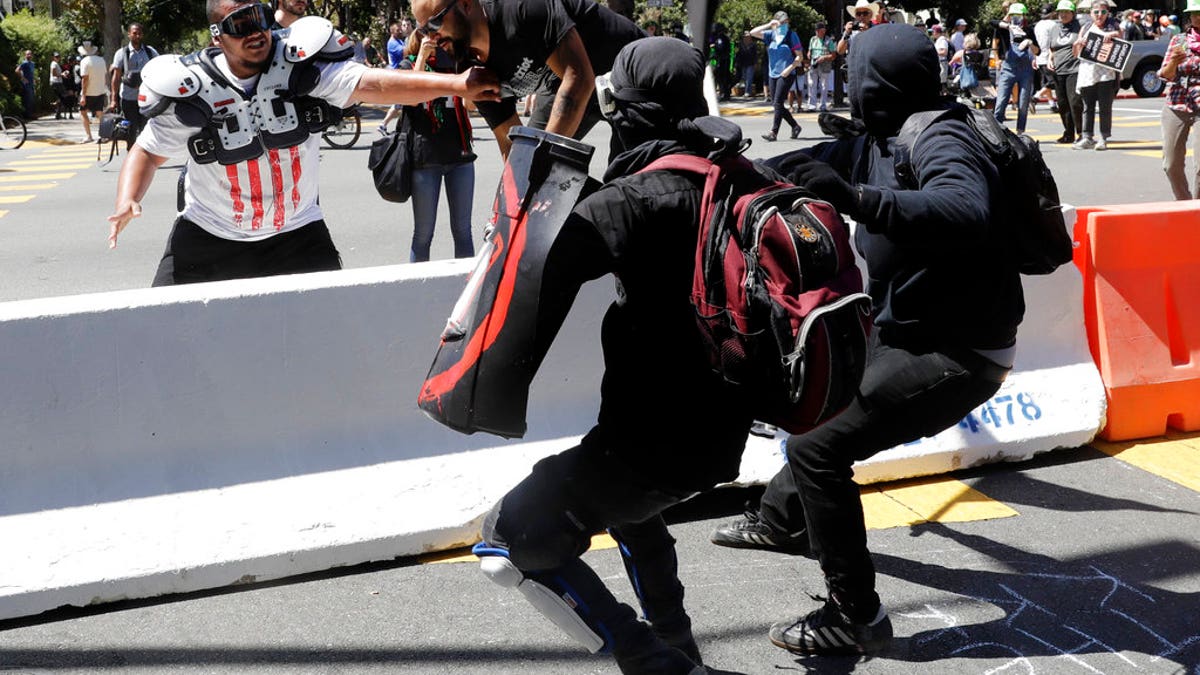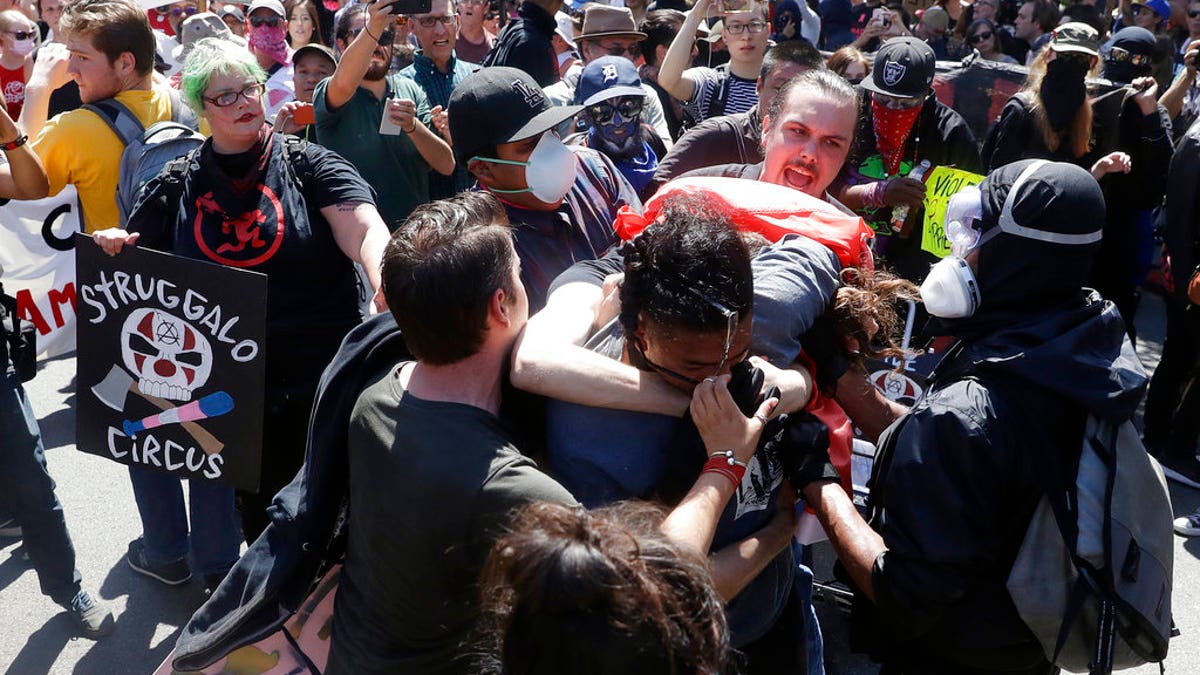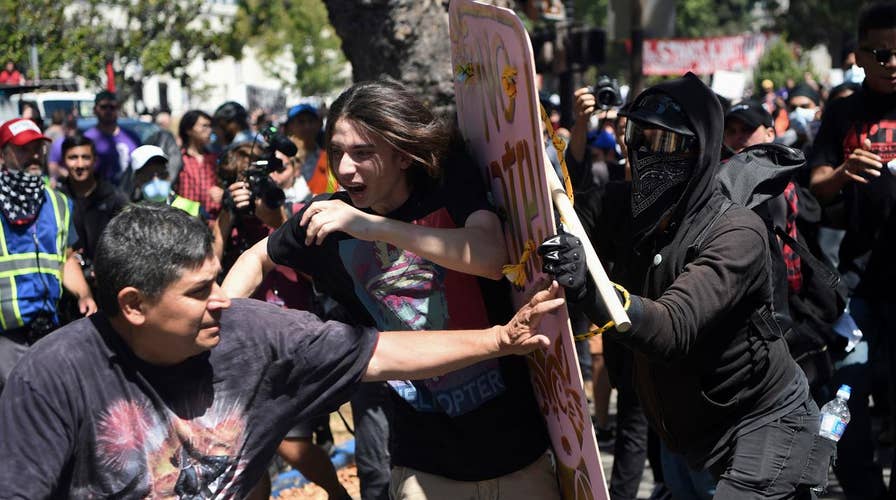Antifa members attack peaceful right-wing demonstrators
Fox News contributor Kevin Jackson sounds off about the controversy
About 100 black-clad activists carrying makeshift shields and clubs descended on the California college town of Berkeley over the weekend and viciously attacked a small group of peaceful protestors.
Video footage of the protest shows groups of these activists kicking and punching demonstrators who have fallen in the street, swinging batons at others and threatening to destroy the cameras of anyone documenting their mayhem.
Unlike the deadly clashes in Charlottesville, Virginia earlier this month, these assailants in Berkeley weren’t far-right white supremacists or neo-Nazis, but a group of left-wing counterprotestors known as Antifa.
Short for Anti-fascist, Antifa members have over the last year increasingly made their violent presence known at progressive demonstrations and counter-protests to alt-right groups and speakers across the country – leaving many to question Antifa’s role in the leftist protest movement and to ask if the group is causing more harm than good.
“That’s the big debate,” Pamela Oliver, a sociology professor at the University of Wisconsin who studies collective action and social movements, told Fox News. “Most people think that non-violence is the way to go and that violent, aggressive responses could backfire, that is play into the hands of white supremacists by using violence.”
The Antifa movement traces its roots back to militant anti-fascists operating in Nazi Germany during the 1930s, but the emergence of these modern groups in the United States – which are predominantly comprised of radical anarchists and focus more on fighting far-right ideology than on encouraging pro-left policies – coincided with the rise of white nationalists following the election of Barack Obama in 2008.
Since the election of President Trump, Antifa activists have become even more active, clashing with right-wing activists and police in cities from Philadelphia to Houston to Hamburg, site of this year’s G-20 summit.
There have been suggestions Antifa agitators were responsible for much of the destruction in Washington, D.C., on Inauguration Day. And while white supremacists and neo-Nazis were certainly to blame for much of the violence in Charlottesville, they claim that Antifa groups got aggressive first.

Demonstrator Joey Gibson, second from left, is chased by anti-fascists during a free speech rally Sunday, Aug. 27, 2017, in Berkeley, Calif. (AP Photo/Marcio Jose Sanchez)
Berkeley – a hotbed of activism of on both sides of the political divide since the 1960s – has been the scene of much of Antifa’s activities over the last year. In February, 150 black-clad protestors rampaged through the streets of Berkeley, where they caused $100,000 worth of damage and forced the University of California to cancel a planned speech by far-right provocateur Milo Yiannopoulos.
Criticism of the movement has come not just from conservative politicians and far-right activists, who are the target of much of Antifa’s actions. Mainstream liberal lawmakers and the editorial boards of some of the country’s largest newspapers have also harshly criticized Antifa for promoting violence.
House Minority Leader Nancy Pelosi said in a statement on Tuesday that Antifa’s attacks on protestors in Berkeley “deserve unequivocal condemnation, and the perpetrators should be arrested and prosecuted.”
The Los Angeles Times editorial board was even harsher, calling Antifa “traitors to the thousands of peaceful demonstrators who gathered in Berkeley’s Martin Luther King Jr. Civic Park to counter a ‘No to Marxism in America’ rally” and calling the group’s actions “thuggery, not activism.”
While Antifa’s group in Berkeley did not respond to Fox News’ request for comment, the group posted a tersely worded response to Pelosi’s statement – saying that the California congresswoman has a lower approval than Trump and adding that they don’t care what she thinks.
Antifa defends its use of violence by pointing back to the movement’s roots fighting fascists in Hitler’s Germany, Mussolini’s Italy and Franco’s Spain.

Demonstrators clash during a free speech rally Sunday, Aug. 27, 2017, in Berkeley, Calif. (AP Photo/Marcio Jose Sanchez)
“In the 1930s, the Nazis used violence to intimidate people,” Oliver said. “Antifa argues that if people resisted them then, the fascists wouldn’t have gotten so big.”
Despite condemnation of the movement in the wake of Sunday’s violence, Antifa still has numerous prominent defenders among the leftist activist community.
A visiting professor at Dartmouth University gained widespread attention for defending Antfa's use of violence during numerous television interviews.
"I think that a lot of people recognize that, when pushed, self-defense is a legitimate response to white supremacy and neo-Nazi violence," Mark Bray, the author of "Antifa: The Anti-Fascist Handbook," said on NBC's "Meet the Press" on Aug. 20. "The lesson of history is you need to take it with the utmost seriousness before it’s too late."
Following the clash in Charlottesville, many counter-protestors to the “Unite the Right” rally praised Antifa activists for protecting them from attacks by white supremacists and neo-Nazis.
“If it hadn’t been for the anti-fascists protecting us from the neo-fascists, we would have been crushed like cockroaches,” social activist and Harvard University professor Cornel West said afterwards.
Antifa has also been credited with protecting counter-protestors at the so-called “Battle of Berkeley” – a clash at a white supremacist rally in April that has been called a test run to Charlottesville and where white nationalist Nathan Damigo was seen on camera punching a woman in the face for purportedly being a member of Antifa.
But on Sunday it was the counter-protestors themselves – estimated to be about 4,000 – protecting the demonstrators they were there to disrupt from the punches of Antifa. And it is this inclination toward violence and a radical ideology – the same type of concerns that plague moderate right-wingers trying to deal with neo-Nazis and white supremacists – that has moderate leftists wondering what to do about Antifa
“There are so many different sides, it's just not a left and right issue,” Oliver said. “It’s a really difficult situation.”


